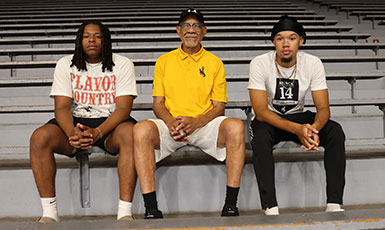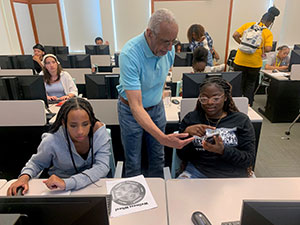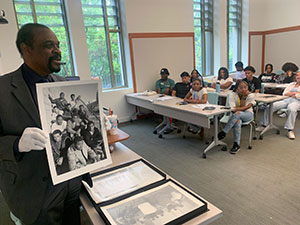
Contact Us
Institutional Communications
Bureau of Mines Building, Room 137
Laramie, WY 82071
Phone: (307) 766-2929
Email: cbaldwin@uwyo.edu
Participation in UW’s Black 14 Social Justice Summer Institute Grows
Published August 18, 2023

University of Wyoming Black 14 member Lionel Grimes, of Reynoldsburg, Ohio, center,
is flanked by his great-nephews Corian Grimes, of Akron, Ohio, left, and Jayce Crockett,
of Alliance, Ohio. They are sitting in War Memorial Fieldhouse, where Grimes and his
Black 14 teammates were told by then Cowboys football Coach Lloyd Eaton that he was
dismissing them from the team for wanting to protest the Church of Jesus Christ of
Latter-day Saints’ policy of prohibiting Black persons from attaining the priesthood.
(UW Photo)
All Lionel Grimes hoped for during the second annual Black 14 Social Justice Summer Institute at the University of Wyoming was for the student participants to learn how to get along with one another and to grow in becoming great individuals.
Grimes, of Reynoldsburg, Ohio, learned a long time ago what it means to overcome adversity thrown his and his UW Black 14 teammates’ way. Five decades later, he is engaging a new generation of teenage high school students about what it means to be a good person in life.
The recent Black 14 Social Justice Summer Institute saw huge growth in year two of the annual program, jumping from six participants in the inaugural session to 24.Five states were represented, stretching from Wyoming to Pennsylvania.
On a Friday in mid-October 1969, 14 African American Cowboy football players requested a meeting with their head coach, Lloyd Eaton, to seek his permission to wear black armbands during a home game the following day against Brigham Young University. The request was to protest racist policies of the Church of Jesus Christ of Latter-day Saints, which precluded African Americans from becoming priests in the church.
The Black 14 players never got the chance to explain how they wanted to protest peacefully. Eaton dismissed them immediately, forever changing their lives.
Since then, UW and the former student-athletes have moved forward to ensure that the lessons of one of the most turbulent times in the university’s history are not forgotten. On the 50th anniversary of being dismissed from the team, UW officially offered a letter of apology in 2019 to the dismissed players.
In honor of the Black 14 legacy, UW’s Office of Diversity, Equity and Inclusion, and the Social Justice Research Center created the summer program for high school students interested in individual freedom of expression; civil rights and social justice; and exploration of diversity, equity and inclusion principles.
“The richness of this program is constantly growing because of the university and the support of the community. Our expectations will remain high, and the main thing is we want to see if we can get more students each year,” says Zebadiah Hall, UW’s vice president for diversity, equity and inclusion. “If we can make it to 40 students next year, it will be really exciting for us. The goal is to continuously get the word out for us to grow each year.”

UW Black 14 team member John Griffin, of Denver, Colo., works with participants
Lidia Berhe and Mary Elizabeth Sekibo, both from Aurora, Colo., on their projects
during the second annual Black 14 Social Justice Summer Institute on the UW campus.
(UW Photo)
Grimes and teammate John Griffin, of Denver, Colo., were attending their second symposium; another Black 14 member, Guillermo “Willie” Hysaw, of Irvine, Calif., joined them during the week.
The summer institute is more personal for Grimes: Two of his great-nephews attended this year’s event -- Jayce Crockett, of Alliance, Ohio, who also attended last year, and Corian Grimes, of Akron, Ohio.
“Personally, it’s very satisfying to see them interested in the Black 14, and to have them here with me has been amazing,” Lionel Grimes says. “I think that it has opened their eyes to a lot of things that they were not aware of and, hopefully, going forward, to stand on our shoulders and be able to seek some of the rewards of our past.”
Corian Grimes says he first learned about the symposium from Jayce and wanted to attend last year but could not commit. He admits that he did not know most of the history of the Black 14 because his great-uncle never talked about it in detail.
“I had no idea that this happened to my family. I was a little hurt because it happened to someone in my family and the fact that they had to go through something like this,” he says, adding that he wishes more people would learn about the Black 14. “Not that many people know about this, and I feel it’s been brushed off. They should be recognized more because of what they had to go through. They fought for what they thought was right.”
Bella Bustos, who will be a senior at Laramie High School this fall, says her parents and grandparents did not know the full story of what happened on campus nearly 55 years ago. She adds that the institute taught her quite a bit about the players’ plight.
“My first thought was how impactful it was, how they really stood up for what they wanted and how their story really affected a lot of people,” she says. “My second thought was how their story was so unknown because it seems like that it wasn’t important, but it was such a big event and that it did happen. It was powerful, but somehow the story got lost.”
Mekhi Bovee, a Casper Kelly Walsh High School junior, came to the institute on the advice of his sister, Meeshla, who attended the inaugural session and was a mentor for the latest event. They knew the Black 14’s story because of their grandmother.
“Our grandmother told us the basics of the story,” Mekhi Bovee says. “When I came to the institute, I didn’t have any expectations. I was hesitant to begin with, but I am so glad I did come because there is so much diversity here.”
Both Bovee and Bustos agree that more Wyoming students should know about the Black 14.

Guillermo “Willie” Hysaw, of Irvine, Calif., shows students in the Black 14 Social
Justice Summer Institute an original photo of himself and his Black 14 teammates posing
for a photograph that appeared on the cover of Sports Illustrated after they were
dismissed from the Cowboys’ team more than 50 years ago. (UW Photo)
“Yes, 100 percent, not even just from a social justice standpoint of how people make changes, but from a standpoint of people being heard,” Bustos says. “For things like this to happen, and not that many people to know about it in our own backyards, I think it’s very important for others to know about their story.”
During the week, students were engaged in many projects and tours, and they also completed final “photovoice” projects. The students photographed what they felt best represented what they had learned throughout the symposium and then wrote personal essays. The students then displayed the projects during a public reception on the final night to explain what they learned, all centered on diversity, equity and inclusion. It all added up to personal growth.
“I hope they all continue to grow as individuals and to learn about diversity, equity and inclusion because, like I always said, the world is not white, black or brown,” Lionel Grimes says. “We all need to learn to get together and, if you have problem, I would hope the students learn to agree to disagree and continually to be great individuals.”
Among the participants in this year’s symposium, listed by hometown were:
-- Akron, Ohio: Corian Grimes, of Reynoldsburg, Ohio.
-- Alliance, Ohio: Jayce Crockett and Dariana Thomas.
-- Aurora, Colo.: Lidia Berhe, Lorenzo Contreras, Lauretta Ebong, Lawrencia Ebong, Mary Elizabeth Sekibo, Jizele Sims, Deborah Teklehana, Ifeomachukwu Ugeh and Hiwot “Zoey” Woldemichaell.
-- Casper: Mekhi Bovee.
-- Commerce City, Colo.: Jeffrey Zokoua and Jeremiah Zokoua.
-- Denver: Tynisa Huntington, Nannette Kankam and Eden Lander.
-- Englewood, Colo.: Taliyah Carrington.
-- Laramie: Bella Bustos, Carson Heaney and Tyrell Hodges.
-- Lisle, Ill.: Ella King.
-- West Grove, Pa.: Christian Cauley.
Contact Us
Institutional Communications
Bureau of Mines Building, Room 137
Laramie, WY 82071
Phone: (307) 766-2929
Email: cbaldwin@uwyo.edu
